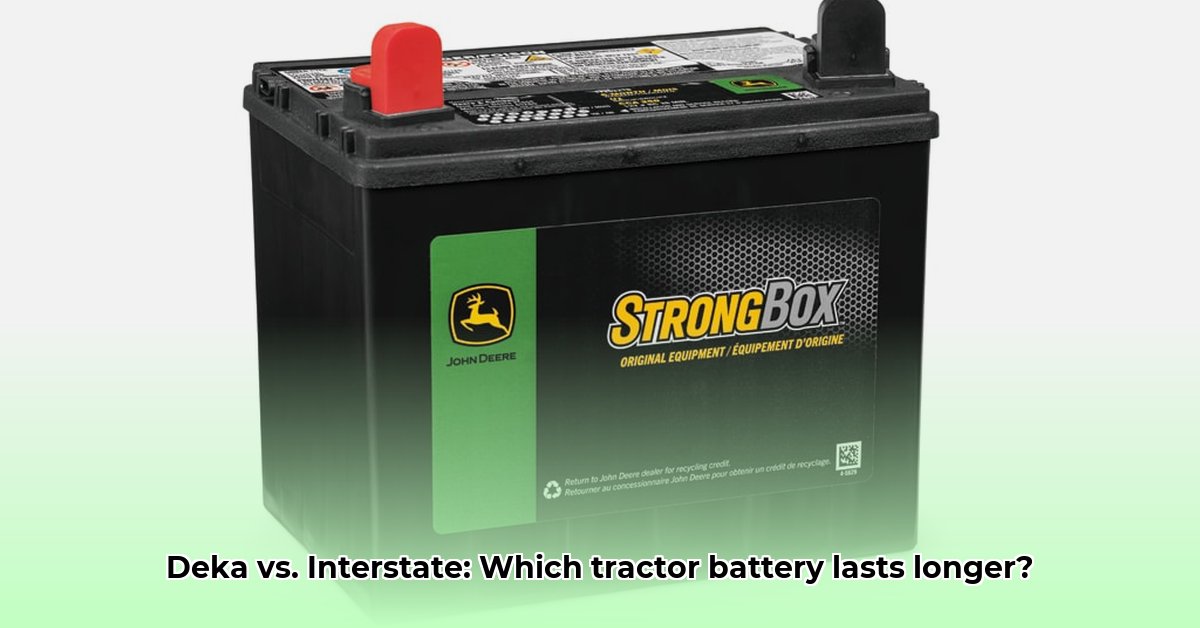
Picking the right tractor battery is crucial for maintaining efficient and sustainable farming operations. Downtime translates directly to lost revenue and increased stress. This comparative review analyzes two leading brands—Deka and Interstate—to help you choose the best battery for your needs, considering factors like lifespan, cost, and environmental impact. For more on battery lifespan, see this helpful guide: Tractor Battery Life.
Understanding the Importance of a Reliable Tractor Battery in Sustainable Agriculture
Sustainable farming hinges on reliable equipment. Consistent power from a dependable tractor battery is paramount for uninterrupted operations and successful harvests. A failing battery leads to costly delays and potential crop damage. Therefore, selecting a high-quality battery is a critical investment in the long-term health and profitability of your farm. But with numerous options available, how do you choose the best fit? This guide will compare Deka and Interstate batteries, two prominent players in the heavy-duty battery market.
Deka Batteries: A Focus on Longevity and Durability
Deka batteries are recognized for their extended lifespans. They utilize advanced technologies and materials to achieve superior performance and longevity. A key feature is their "dry-charge" technology (a battery shipped without liquid electrolyte), enhancing shelf life and minimizing storage challenges. This contributes to more sustainable practices by reducing waste and transportation costs associated with liquid electrolyte.
Pros of Deka:
- Extended Lifespan: Deka batteries are engineered for long-term performance, potentially reducing long-term costs.
- Reduced Waste: The dry-charge process minimizes environmental impact compared to traditional flooded-cell batteries.
- Robust Construction: Deka batteries are known for their durable construction, built to withstand the rigors of farm use.
Cons of Deka:
- Higher Initial Cost: Deka batteries typically command a higher price point than some competitors.
- Limited Availability: Depending on your location, sourcing a Deka battery might require more effort.
Interstate Batteries: Wide Selection and Diverse Applications
Interstate offers a broader range of heavy-duty tractor batteries than Deka, making it easier to find a precise match for your specific tractor model and power requirements. While also emphasizing long battery life, Interstate prioritizes providing appropriate power solutions for a wider variety of agricultural equipment needs.
Pros of Interstate:
- Extensive Selection: A diverse range of models caters to various tractor types and power demands.
- Wide Availability: Interstate batteries are generally more readily available through various retailers.
- Competitive Pricing: Some Interstate models offer a potentially better value proposition.
Cons of Interstate:
- Lifespan Variability: The lifespan of Interstate batteries can vary significantly across different models.
- Lack of Comprehensive Data: Direct comparison of performance data across models is often limited.
Deka vs. Interstate: A Comparative Analysis
Direct comparison between Deka and Interstate is challenging because manufacturers don't always provide the same detailed specifications. However, based on available information, here's a summary of key differences:
| Feature | Deka | Interstate |
|---|---|---|
| Expected Lifespan | Generally longer | Varies greatly by model |
| Typical Price | Higher | Lower to comparable |
| Model Range | More focused range | Wider selection |
| Dry-Charge Technology | Standard feature | Not typically a standard feature |
Choosing the Right Battery: A Step-by-Step Guide
Selecting the optimal tractor battery depends on your unique circumstances. Here's a structured approach:
Assess Your Needs: Define your tractor's power requirements, considering both starting and deep-cycle demands. Consider your budget and anticipated usage.
Compare Specifications: Review the Cold Cranking Amps (CCA), reserve capacity (RC), and the manufacturer's stated lifespan for competing models.
Calculate Total Cost of Ownership: Factor in the initial price and potential replacement costs over several years. A more expensive battery with a longer lifespan might prove more economical.
Seek Expert Advice: Consult with your local mechanic or agricultural equipment supplier for personalized recommendations.
Sustainability Considerations: Beyond the Battery Itself
Choosing a durable, long-lasting battery is a crucial step towards sustainable farming. However, responsible disposal and recycling are equally important. Inquire about the manufacturers' battery recycling programs and choose brands committed to environmentally friendly practices.
The Future of Tractor Batteries: Innovations on the Horizon
Significant advancements in battery technology are transforming the agricultural landscape. Lithium-ion and solid-state batteries are poised to offer substantial improvements in performance and lifespan. Simultaneously, the development of robust battery recycling programs remains crucial for minimizing environmental impact.
Key Takeaways and Actionable Steps
- Both Deka and Interstate provide reliable batteries for agricultural use, but their strengths differ.
- Prioritize either long-lasting power (Deka) or powerful starting capabilities (Interstate) based on your needs.
- Analyze the total cost of ownership (initial price + potential replacements).
- Consult verified customer reviews to gauge real-world performance.
- Explore the differences between AGM and flooded-cell batteries to make an informed decision.
By carefully considering these factors, you can select a tractor battery that optimizes your farm's efficiency, sustainability, and profitability.